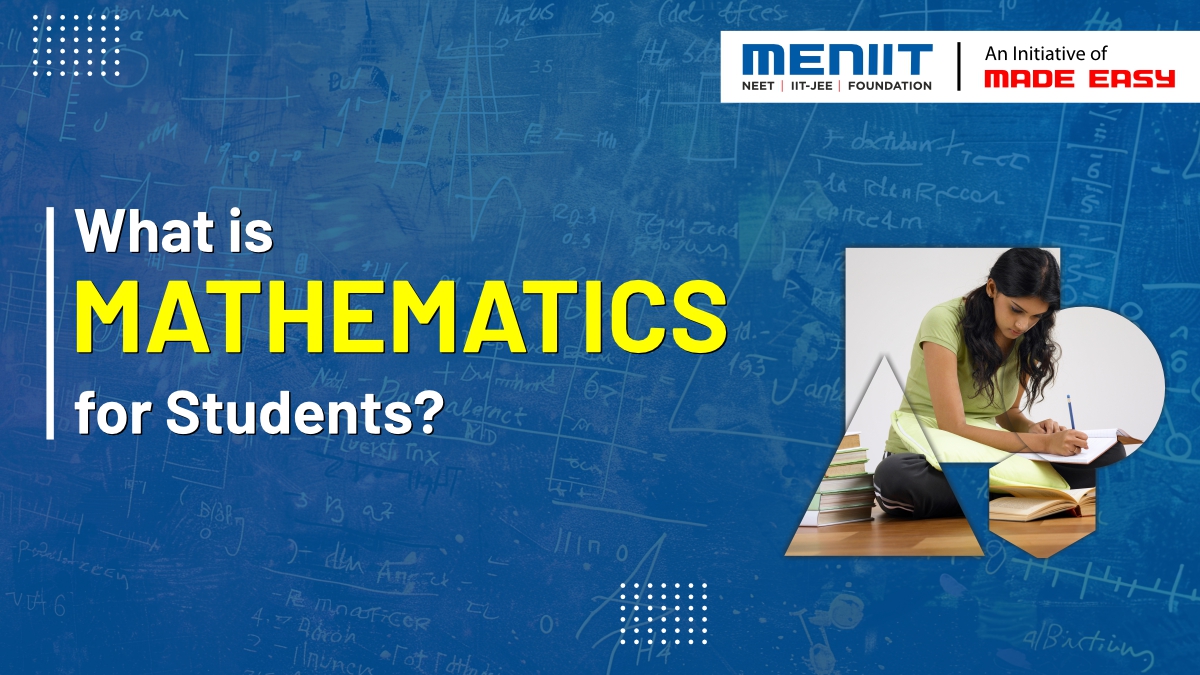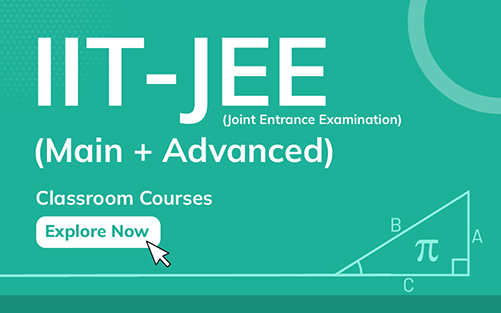What is Mathematics for Students?

Mathematics is one of the interesting and important subject yet it is avoided by most of the students. Generally, once in a lifetime, mathematics has become the hard nut to crack for every student. However, this is not the real nature of this beautiful subject.
So what mathematics is? Why the word “Mathematics” creates fear in the mind of most of the students. Let us understand this.
Mathematics is the language of nature. It helps to understand the laws of nature in a simplified manner. Generally all the universal laws, be it the laws of motion, law of gravitation or Lenz’s law, Ohm’s law mostly all are explained easily with the help of mathematics.
One of the most frequent question that comes in the mind of many people is that what is the use of mathematics? Where the trigonometric ratios, theorems of circles, herons formula, algebraic identities, geometry or calculus etc. can be used in real life.
This subject has multiple uses, from daily life to advanced calculation, from counting numbers to counting atoms, from managing the household budget to managing the banks, from measuring the height of the building to measuring the volume of earth. Mathematics has its own share in nearly each and every domain. Hardly there would be any area where mathematics is not used. Yet students consider it as one of the most difficult subject. Let us explore some of the reasons for this.
There may be multiple reasons why most of the students found Mathematics difficult is some of them are: wrong teaching techniques, lesser interest, less practice, weak basics, or wrong techniques. Other than the mentioned reasons, one reason could be wrong perception and introduction of mathematics among the students. From a very young age, this subject is presented as something out of the world. Instead of making it interesting and easy, most of the parents and teachers present it as the most difficult subject which is completely opposite to its nature.
This blog will burst all such myths and misconceptions which are deeply rooted in the mind of students and society. Also, this blog will provide some techniques which can help students to develop their interests in mathematics and to do better in this wonderful subject.
Table of Contents
Importance of Mathematics for Students
Remember the day when you first started learning about numbers, counting, tables, etc.? It stayed with you for a lifetime. Those little things that you learned in your childhood help you today and in the future, too. Even if someone is not interested in Mathematics, no one can get rid of numbers and words. In this social structure, where humans are the social animals, numbers are one of the most important entities. No one can stay without using numbers. This is just an example. If we go further, various topics/subjects of mathematics are used for various purpose, for example the trigonometric ratios can be used to measure the length of a building, the algebraic identities can be used to do fast calculation, the engineering curriculum can’t be imagined without calculus. These are just a few examples highlighting the importance of mathematics in our daily life.
Let us find out why mathematics as a subject is important for the students.
Students are the future of any country; the way students are moulded gives a rough idea of how the country is going to be in the future. For any developing country, it is important that its citizens are well-read, have problem-solving abilities, or have critical thinking. For developing problem-solving ability and critical thinking, it is important to have a good grasp on mathematics because mathematics is a subject that is used in many subjects such as science, economics, engineering finance, etc.
Other than this, mathematics provides the basic knowledge for learning many other school subjects. Even if someone is not interested in studying mathematics in higher grades, they still have to study mathematics up to class 10th as it trains them to develop the critical thinking ability which is an important skill in the 21st century.
Apart from this, mathematics is an important subject for those who are preparing for competitive and entrance exams. Mathematics is an important subject for technical exams like IIT-JEE, GATE, ESE, SSC-JE, RRB-JE and many State Engineering Services Exams. Other than technical exams, general exams like banking and SSC-CGL has good portion of mathematics.
History of Mathematics
Although an exact date is unknown, the history of mathematics dates back to the dawn of humanity. Over the centuries, this subject has been explored by various mathematicians in different parts of the world. Ancient civilizations like India, Babylonia, Egypt, etc. were some of the pioneer civilizations in mathematics in ancient times. During the 5th to 12th century several Mathematical developments took place in India in parallel with the rest of the world. Ancient Indian Mathematicians like Aryabhatta and Brahmagupta are credited for the discovery and use of zero (0), decimals etc. Aryabhatta is also known as the father of Indian Mathematics whereas Archimedes is known as the father of Mathematics. Archimedes is also credited for the introduction of formulas to calculate surface areas and volumes of solids. With the passage of time Mathematicians like Pythagoras, Euclid, Leibnitz, Euler, Heron, etc. gave multiple concepts of mathematics which are still used today.
Why Mathematics is important in Engineering
Engineering is a subject that can’t be imagined without mathematics. From the core branches to software engineering, from conventional to non-conventional branches of engineering, mathematics has been an integral part of the curriculum for mostly all the engineering branches. Topics like calculus, differential equations, probability and statistics, vector calculus, linear algebra, and numerical analysis are some of the most important topics of mathematics in engineering. The reason why engineering is incomplete without mathematics is because most of the laws and rules are explained easily with the help of mathematical equations. From understanding the nature of the RLC (Resistor R, inductor L, and Capacitor C) circuit to Newton’s law of heating, a basic knowledge of mathematics is a must.
Let us have a look at how mathematics is important in some of the engineering branches.
Electrical Engineering:
Mathematics plays a key factor in a proper understanding of electrical engineering. Subjects like electromagnetic field theory require good knowledge of various concepts of calculus, such as double and triple integrals, integration over a closed surface, etc. Linear algebra is used in subjects like network theory, signal processing, etc. Laplace and Fourier transforms are important for subjects like signals and systems, network theory, control systems, etc. Numerical analysis is used in power systems; complex algebra finds its usage in electrical machines, power systems, Network theory, etc.
Electronics Engineering:
Electronics engineering involves the development and testing of electronic systems and communication devices like transmitters, receivers, etc. It is a subfield of electrical engineering, so all the mathematical concepts that are used in electrical engineering are also used in electronics engineering, and apart from that, concepts like integral and differential calculus, linear algebra, and complex algebra are also prominently used in electronics engineering. Apart from this, vectors and statistics are also important in electronics engineering.
Civil Engineering:
Civil engineering is a branch of engineering that deals with the design, construction, and maintenance of public works such as roads, dams, railways, etc. Mathematics plays a very important role in civil engineering. It helps them study the chemistry of materials; trigonometry is used in surveying structures; and the planning of projects and the allocation of budgets depend a lot on mathematics. The cost estimation is dependent on the statistics and account. Other than that, the calculation of the thickness and number of columns also requires the use of mathematics. Calculus helps civil engineers measure the rate of change in functions.
Mechanical Engineering:
In mechanical engineering, calculus is used for determining the velocity and acceleration of a vibrating object. Simultaneous linear equations and differential equations are used to find the exact equation of nodes of vibration. Thermodynamics and heat transfer involve the use of Laplacian operators, gradients, divergence, etc. Algebraic concepts are used in mechanics; logarithmic equations are used to calculate stress, etc.
These are just a few branches and the role of mathematics in them; however, the role of mathematics is way too great in other branches and even in the above-mentioned branches.
In short,
Engineering + Mathematics = Everything
Engineering – Mathematics= Nothing
In which engineering entrance and competitive exams are math questions asked?
Till now, the readers have got a fair idea of the importance of mathematics in real life as well as in academics. For engineers, it is not even possible to imagine the engineering curriculum without mathematics. Mathematics is such a versatile subject that, apart from engineers and engineering entrance exams, many other exams like SSC CGL/CHSL/MTS and banking have a considerable number of questions from it. From the MTS exam to UPSC-CSE, ESE, NDA, and CAPF, nearly every exam has a section on numerical ability or mathematics. Exams like IIT-JEE (IIT Joint Entrance Examination), Graduate Aptitude Test in Engineering (GATE), and Engineering Services Examination (ESE) have a considerable number of questions from mathematics.
Let us have a look at some of the exams where mathematics questions are asked.
- IIT-JEE
- UPSC CSE
- UPSC ESE
- GATE
- SES
- SSC-JE
- RRB-JE
- RRB ALP
- RRB Technician
- NDA
- UPSC CAPF
- SSC CGL
- SSC CHSL
- IBPS PO
- IBPS Clerk
- RRB PO
- RRB Clerk
The level and nature of the questions depends upon the examination and the profile. The questions of mathematics are used to check the mental ability and problem-solving ability of the aspirants.
Career Options in Mathematics
Even though a degree in mathematics is not considered a professional degree, there are still multiple career options in mathematics, some of which are given below:
- Mathematics Teacher: Someone who loves shaping young minds in the right direction should try teaching as a job. Guiding young brains and teaching them mathematics can give a huge amount of self-satisfaction.
- Financial Planner: Financial planners help organizations prepare stock market strategies and new business ideas and also help in managing the financial assets of the organization.
- Data scientist: In the present time, hardly there would be anyone who doesn’t know about data scientists. Data scientist is one of the most demanding jobs in the present time. Mathematics helps data scientists to analyse and model data.
- Statistician: A statistician has a variety of roles, which include the collection in an organized manner, the analysis of collected data, making predictions on the basis of data, sharing the results, etc. Statisticians help the organization make decisions on the basis of data.
- Actuarial analyst: An actuarial analyst uses mathematics and statistics to evaluate risk, uncertainty, and manage data in various sectors, mainly insurance. They develop financial projections, cost-benefit analyses, and insurance plans using statistics.
- Operation Research Analyst: Operation research analysts use mathematics to manage and evaluate data and help organizations solve their problems.
- Research: Research has been a favourable career option for mathematics graduates from long time, and it is still in demand.
- Data Analyst: Data science can’t be imagined without mathematics. Concepts like linear algebra, statistics and probability, calculus, information theory, etc. are very important in the complete understanding of data science. Other than this, other concepts of mathematics are required to identify the patterns and help in creating algorithms.
- Economist: Various mathematical models are used to represent complex economic phenomena. Various techniques, such as calculus, help to maximize the profits for the firms or minimize the cost for consumers.
- Mathematician: A person who is specialized in mathematics is called a mathematician. A mathematician can engage in various roles such as teaching, research, consultation, etc.
- Quantitative Analyst: Quantitative analyst apply mathematics and statistical techniques to analyse the financial data and inform invest decisions.
These are a few of the careers that can be followed after completing graduation in mathematics. These are just a few names; the list can go on; however, one must follow their heart and passion before choosing any career option.
Top Colleges in India for pursuing graduation in Mathematics:
There are many colleges in India that offer undergrad, postgrad, and Ph.D. in mathematics. Some of the top colleges are given below.
These colleges are not placed according to the NIRF ranking.
- IISC, Bangalore
- All the IIT’s
- ISI, Kolkata
- ISI, Delhi
- CMI
- TIFR
- HRI
- Institute of Mathematical Science
- AMU
- St. Stephen College, Delhi
- IISER
Those who wish to enrol in these colleges can visit the website for more information regarding the admission process.
Students preparing for GATE, CSE, ESE, SES, RRB-JE or other engineering exams can refer to the latest and updated mathematics books available in the market.
FAQs:
What is the full word for math?
Answer: Mathematics is the full word of maths.
What is mathematics and why is it important?
Answer: Mathematics is an important subject as it is useful in daily life as well as in competitions. Disciplines like engineering can’t be imagined without mathematics.
Who is the father of mathematics?
Answer: The Greek mathematician, Archimedes is known as the father of mathematics, due to his contributions in the subject. Aryabhata is known as the father of Indian mathematics.
What kind of math is used in engineering?
Answer: Different topics of mathematics are used in different branches of engineering. From calculus to liner algebra, from complex numbers to probability and numerical methods, each topic has their own importance in engineering.
Can I do engineering if I am weak in maths?
Answer: Yes, anyone can do engineering even if he/she is weak in maths, however, the individual has to work hard in order to grasp the mathematical concepts.
When is National Mathematics Day?
Answer: Every year 22, December is celebrated as National Mathematics Day to mark the birth anniversary of the renowned Indian Mathematician, Srinivasa Ramanujun.
How would you want to define mathematics, do you like the subject?
Answer: Mathematics is an interesting subject, which has applications in generally every field and in real life as well. If studied properly this is one of the most simple and easy subjects. A good grasp over mathematics helps in developing the logical as well as problem-solving ability of an individual. It also helps to boost the confidence of an individual.
















